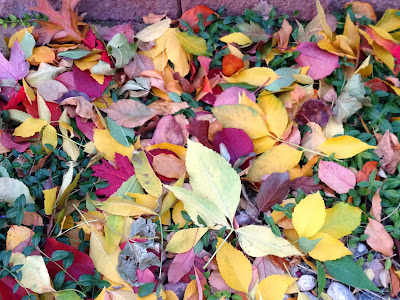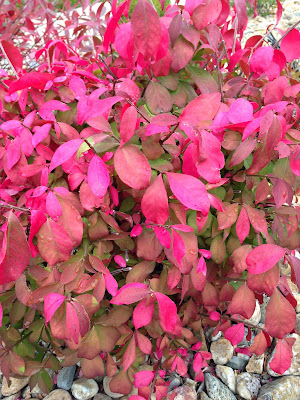As the upcoming Resonance concert* approaches, the talk list has carried a lot of discussion among
chorus members about the meaning of some of the songs and some of the
lyrics. Some of this discussion has focused on poetic descriptions of nature—the
meaning of phrases like "orange sticks of the sun" and "ponds
... like black cloth on which are painted islands of summer lilies." Another, but related, thread has explored the relationship between ourselves and nature—specifically the notion that we humans are responsible
for great damage done to nature through our own acts. Especially, I have to say, the acts of the wealthiest and most powerful humans. Which
includes (at least most of) us.
To me, these two topics seem connected. They are linked by their attention to the two sides of our (ambivalent) relationship with the natural world. On the one hand, we cherish and celebrate nature in all her wild glory. And on the other, we seem driven not to cherish but to claim,
tame, and own nature's bounty. The reverence is seen in our striving to find words that can capture nature's magnificence. The sense of dominion is seen in our tendency to
ignore even the messages so clearly written in melting ice caps and rising
temperatures, in displaced and vanished species and increasingly frequent
extreme weather events telling us, shouting at us, that our relationship with the planet is in deep trouble, and we bear the responsibility for that trouble. In the past few weeks, I've come across several articles
about this general domain that seem particularly compelling. Which is to
say that it's hard for me to imagine that we wouldn't be compelled by these
stories to at least think about our responsibility
vis-à-vis the planet. (If you harbor any doubt about that responsibility, check out the most recent report of the UN's Intergovernmental Panel on Climate Change.)
So, three stories that might give us all pause ...
The first story may
seem obscure at first glance, but not so much when you consider the
implications. The basic story is that scientists recently discovered a 30,000-year-old virus preserved in the Siberian permafrost. Since this virus apparently infects only single-cell
organisms, it's not a direct risk to humans. Still, this finding raises the
possibility that as the climate warms, ancient viruses of other sorts might
emerge that could infect humans.
Consider, for example, what might happen if ancient Neanderthal viruses melted
out of the thawing permafrost (or not-so-permafrost).
Our immune systems haven't evolved to deal with these archaic viruses, so
humans could be at huge risk. This could be a mighty high price to pay for our
refusal to notice what we're doing to the planet.
A second story
might also seem remote from most of us—in space if not in time—but it turns out not to be. We've heard for
years that glaciers and polar ice are melting at increasingly rapid
rates—faster, even, than the rate predicted by most climate change models. Glaciologists have recently suggested that one of the factors leading
to this rapid melting is small particles of dust and soot that darken the ice
and snow. The darker color absorbs more heat, thereby increasing the speed of
melting. One source of this "dark snow" is distant forest fires. And,
to take the next step, we know that the overall pattern of increasing temperatures
and increasingly frequent and severe wildfires is associated with climate change and with human incursions into wildland areas.
Again, our role in the spiral of increasing damage to the earth is not hard to
spot.
Finally,
the recent tragic mudslide in Washington State provides another cautionary
tale. In this circumstance—as in situations where wildfires claim lives and
property in the wildland-urban interface or floods do the same near bodies of
water—we have chosen to locate our lives in the paths of danger, even as we
exacerbate that danger by our own actions. In the case of the Washington slide,
a major landslide had been predicted in this location for some time—in fact, this same hill had slid several
times in the recent past. Yet, questionable logging practices continued, and
folks continued to live in this lovely valley at the beautiful foot of this precarious
hill. As if we weren't at risk. As if we weren't responsible—either for what
might happen (the "act of nature") or for how we deal with known
"natural" risks. In this case, as in many, we can add to the (perhaps naive or misinformed)
denial of danger on the part of homeowners the persistent, intractable politics
of avarice and greed: the fear that land will lose value if you tell people it’s
dangerous. And the equally obstreperous egocentrism of the libertarian call for
freedom from government regulation. Just how large a role is played by these
forces was recently documented in a story about political obstacles to landslide mapping that underlines again our collective role in all this.
There's a line in
one song, "Requiem," that refers to our having “fallen from grace.” One chorus member suggested that this "fall" may lie in our
failure to be proper stewards of the marvelous planet we're privileged to
inhabit. When I read her comment, I agreed immediately and wholeheartedly—and perhaps self-righteously. Still, as I reflect on this now,
I’m reminded of my own easy disregard for the environmental costs of my daily
activities, of my tendency to ignore some personal violations of that
stewardship when convenience beckons. Or to write off some such acts
(unnecessary driving) by appeals to my conscientious attention to other areas
(recycling CFL light bulbs). Even though I know full well that I am, in fact,
responsible for both acts.
As I wander around
in this topic, I keep thinking about the surprising connections
among apparently disparate elements of our experience. I think of the connection
between fires in Colorado and ice melt in the Arctic. Between 30,000-year-old viruses
and future health threats, linked by the 200-year-old industrial revolution. I
think of a town buried or burned or flooded in a slide or wildfire or storm surge—nature
thrown off balance in the wake of individual convictions and collective policies
based on misinformation, disinformation, and monetary myopia. And I also think
of the connection between nature and ourselves. Which is actually an absurd
thing to say, now that I think about it, since we are, after all, part
of nature.
And with this, I return to the stars. I wrote about this before, and it comes back to
me often: We are all—every virus, person, creature, plant, rock, snowfield, and
planet, every flame and slide and flood—made of the stuff of stars. Maybe if we could just remember that, we’d treat one another and the
planet better.
But we’d have to
remember it. Really.
© Janis Bohan, 2010-2014. Use of this content is welcome
with attribution and a link to the post.































